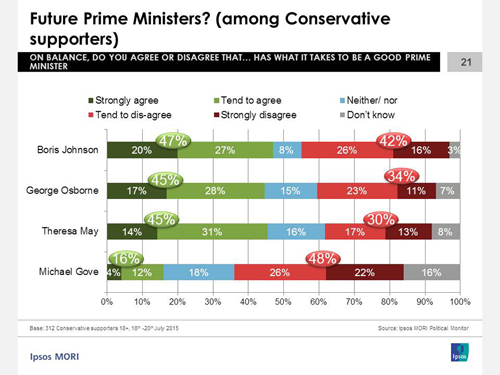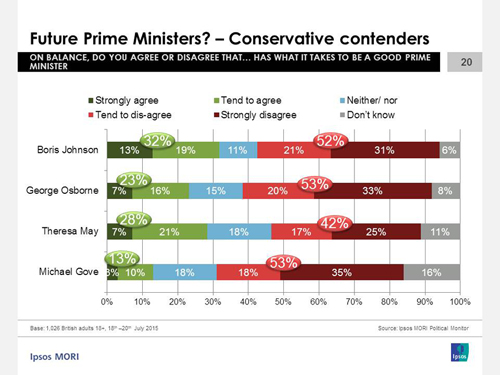Osborne closes gap on May and Johnson as a potential PM among Conservative supporters
Post-Budget, Osborne closes the gap on May and Johnson as a potential PM among Conservative supporters.
On balance, Britons say Budget will be good for them personally, but split on whether it will be good for the country
The first Ipsos Political Monitor following the 2015 budget reveals that the public are divided on what George Osborne’s proposals mean for the country. Forty-six percent say the budget is a good thing for Britain while 44% say it’s a bad thing. Mr Osborne has more to smile about when the public reflect on what the budget means for them personally. Forty-five percent say the budget is a good thing for them personally while 38% say it’s a bad thing – with groups such as men, older people, the middle classes, private sector workers and home-owners particularly positive.

Like the budget, the public are also divided in their evaluation of George Osborne as Chancellor of the Exchequer. Evenly split, 44% percent say they are satisfied with Mr Osborne’s performance while another 44% say they’re dissatisfied. This is little change from March when 43% were satisfied with the Chancellor and 42% dissatisfied. Nevertheless, this means that Mr Osborne maintains the best ratings for a Conservative Chancellor since Nigel Lawson in March 1987.
The Ipsos poll also reveals that the future race for the Conservative party leadership is wide open, among Conservative supporters at least, as George Osborne has closed the gap between himself and Boris Johnson and Theresa May. While 47% of Conservative voters agree Mr. Johnson has what it takes to be a good Prime Minister Mr Osborne shadows behind by only 2 points (45% thinking he has what it takes to be a good PM – a 13 point increase from July 2014). Theresa May also rates well amongst Tories with 45% saying she has what it takes to be a good PM, although only 16% feel the same about Justice Secretary Michael Gove. The Mayor of London is though more divisive than Mr Osborne or Ms May, with 42% of Conservatives disagreeing he has what it takes to be a good PM, compared with 34% for the Chancellor and 30% for the Home Secretary.

Amongst the public as a whole Boris Johnson leads when asked if he “has what it takes to be a good Prime Minister”. One in three (32%) agree Mr Johnson has what it takes - however half (52%) disagree. Theresa May follows the London Mayor with 28% saying she has what it takes (42% disagreeing), followed by the Chancellor (23% has what it takes, 53% disagree). Mr Gove trails well behind with 13% agreeing he has what it takes and 53% critical.

Meanwhile David Cameron’s post-election honeymoon has receded, with his public satisfaction ratings falling seven points to 42% (49% dissatisfied, also up seven). Nigel Farage has made some gains in his satisfaction level (up two points to 31%) while 44% say they’re dissatisfied with the UKIP leader (down three points). The public are evenly spilt however over Harriet Harman as caretaker of the Labour party. One in three (33%) say they’re satisfied with Ms Harman while another one in three (34%) say they’re dissatisfied. Labour supporters are as dissatisfied with her as Conservative supporters (30% and 28% respectively), although Labour supporters are also more positive (43% vs 33%).
Economic optimism remains broadly steady. While 42% think the economy will improve over the next 12 months (no change from June), 28% think it will get worse (up 2 points), giving an Economic Optimism Index of +14.

Gideon Skinner, Head of Political Research at Ipsos, said:
“George Osborne is continuing where he left off, and has boosted his standing among Conservatives - although views on the Budget are very different among Labour supporters. But this means that among Conservative supporters, there is now a three-way race between the Chancellor, Boris Johnson and Theresa May as a credible future PM.”
Technical note
Ipsos interviewed a representative sample of 1,026 adults aged 18+ across Great Britain. Interviews were conducted by telephone 18-20 July 2015. Data are weighted to match the profile of the population.


